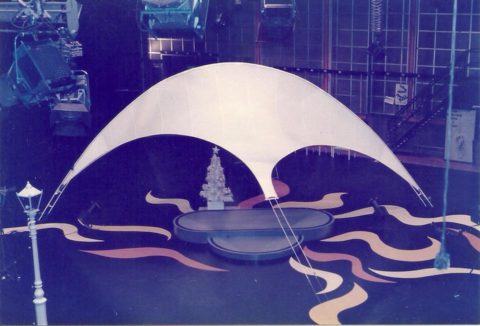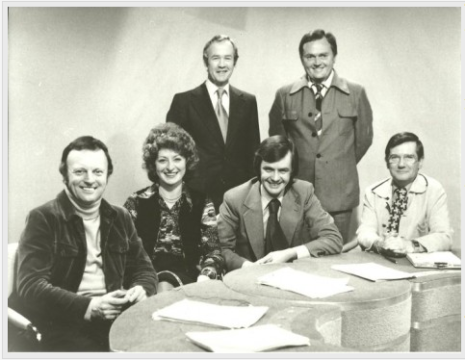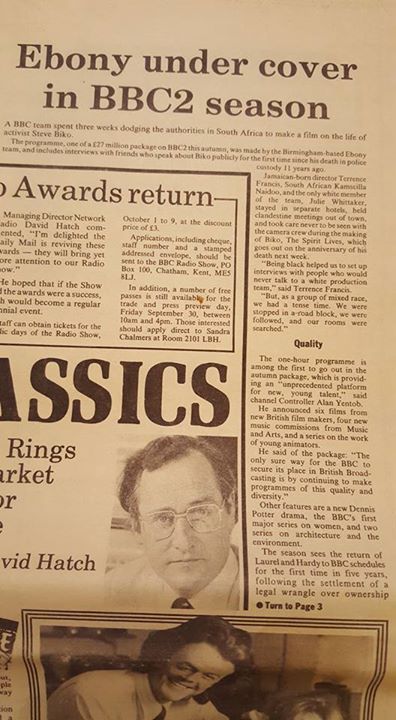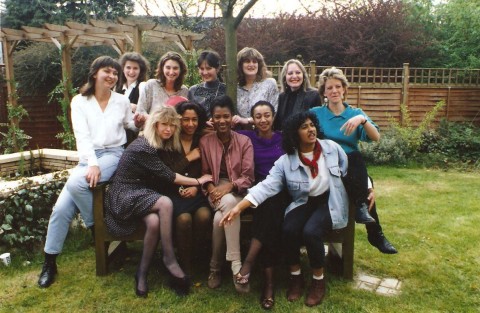
Photo by Lynda Kettle, described as ‘Asian Music and Dance
Here is a list of some of the multicultural programmes produced at BBC Birmingham, from before and during the Pebble Mill period. The list is included in a document housed in the BBC Written Archives at Caversham.
Apna Hi Ghar Samajhiye
(Make Yourself at Home) Radio – Home Service 1965
http://genome.ch.bbc.co.uk/0d248bbb13934a6293989ac1744ede8b
Made at Gosta Green and introduced by Aley Hasan
Nai Zindagi-Naya Jeevan
http://genome.ch.bbc.co.uk/799760c890544c27a9f408fafcd77784
BBC1 Sunday morning programme (late 1960s-early 1970s) which is roughly translated as ‘New Life’ (ran for 14 years)
Gharbar
http://genome.ch.bbc.co.uk/17f97d1ad04e484e9d403bfb27004555
BBC1&2, Women’s magazine show, transmitted on Wednesday mornings from 1977-87
Asian Magazine
BBC1 Sunday mornings 1983-87
http://genome.ch.bbc.co.uk/f3b01c62804743388df183a729484ef3
New Life and Gharbar then became one programme in the early 1980s, called Asian Magazine, which then became Network East
Network East
BBC1&2 Saturday afternoons and Sunday mornings (1987-2003)
http://genome.ch.bbc.co.uk/c0918d9079d8460488d012c3c1d7e000
Ebony
http://genome.ch.bbc.co.uk/34a20f1624ad4a57bc6873ca1f0c3c6b
BBC2, 1983-1990, Afro-Carribean Magazine
Behind the Beat
http://genome.ch.bbc.co.uk/a05e0e41e87c4754a00599de8a0c3fba
BBC2, 1988-9, Music Programme
The following comments were left on the Pebble Mill Facebook page:
Keith Brook (aka Scouse):”‘Nai Zindagi-Naya Jeevan’ was the Urdu and Hindi for ‘New Way -New Life’ but was generically called ‘New Life’. It wasn’t renamed, it stayed like that into the 80s.
I worked on it as a cameraman, of course, but I also did a year or so directing it.
It was great fun, if a little disorganised. Getting everyone from our side into the studio was a little like herding cats.
Still, the real upside was that Ashok Rampal, Saleem Shahed and Mahendra Kaul and I were frequently invited to Indian and Pakistani houses for ‘real’ curries. Absolutely delicious!!
The best one was Madhur Jaffrey’s rather swish place. Best food of all!!
Still, I got a lot of pleasure out of it because it was a programme FOR Asians rather than about. At that time there were many elderly relatives who couldn’t speak English and it was their half hour of entertainment. For that reason alone, it was a delight.
I had the same feeling of fulfillment when I did a stretch on Open University. There wasn’t a big audience for each course, but every programme had an RI of 100%.
Still, every programme we did in Pebble Ill was fulfilling and it was a joy to work with such talented people.”
Terry Barker: “I worked for Nahrendra Morar as his PA from 92 to 94 and remember the diversity of programmes that came out of the multicultural department then. Charles Bruce and Farah Durrani made some terrific documentaries. Had a great time.”
Bridget Catherine Vaughan: “My first staff post, after 2 years of “temping” was in Asian Unit with Lisa Sommerville, Chris Hardman, Jayne Savage…..fab time”
Simon Edwards: “I recall working as camera assistant on the titles (on 16mm) for a programme called “All Black”. Not sure if that was a working title but it would have been early 90’s. We shot some of it in the studio at the Mill and then locations in London. Chris Weaver was the lighting cameraman and Wilfred E-J directed it.”
Keith Brook: “‘Nai Zindagi-Naya Jeevan’ was the Urdu and Hindi for ‘New Way -New Life’ but was generically called ‘New Life’. It wasn’t renamed, it stayed like that into the 80s.
I worked on it as a cameraman, of course, but I also did a year or so directing it.
It was great fun, if a little disorganised. Getting everyone from our side into the studio was a little like herding cats.
Still, the real upside was that Ashok Rampal, Saleem Shahed and Mahendra Kaul and I were frequently invited to Indian and Pakistani houses for ‘real’ curries. Absolutely delicious!!
The best one was Madhur Jaffrey’s rather swish place. Best food of all!!
Still, I got a lot of pleasure out of it because it was a programme FOR Asians rather than about. At that time there were many elderly relatives who couldn’t speak English and it was their half hour of entertainment. For that reason alone, it was a delight.
I had the same feeling of fulfillment when I did a stretch on Open University. There wasn’t a big audience for each course, but every programme had an RI of 100%.
Every programme we did in Pebble Milll was fulfilling and it was a joy to work with such talented people.”
Save







